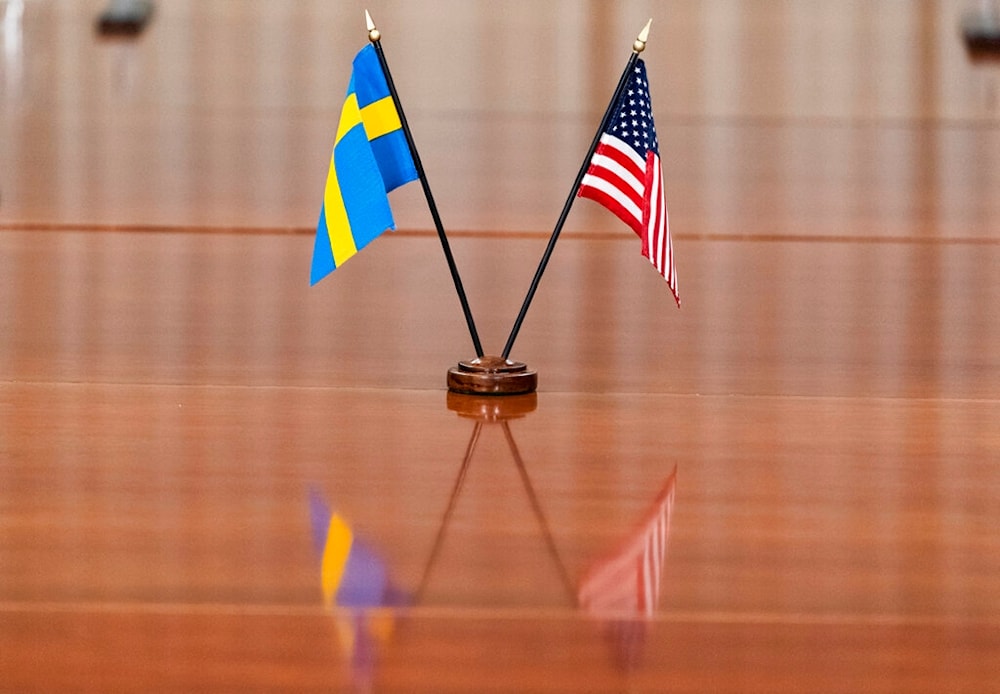Swedish MPs vote on controversial US defense pact amid nuclear fears
The Defense Cooperation Agreement grants the US access to 17 military bases and training sites in Sweden, allowing for the storage of weapons, military equipment, and ammunition.
-

The flags of Sweden and the US are seen on the table during a meeting of Secretary of Defense Lloyd Austin greets Swedish Defense Minister Peter Hultqvist, at the Pentagon, Wednesday, May 18, 2022, in Washington. (AP)
Swedish lawmakers were set to vote on Tuesday regarding a contentious defense pact with the United States, which critics fear could pave the way for the deployment of nuclear weapons and permanent US military bases on Swedish territory.
Signed by Stockholm and Washington in December, the Defense Cooperation Agreement (DCA) grants the US access to 17 military bases and training sites in Sweden, allowing for the storage of weapons, military equipment, and ammunition.
Opponents argue that the agreement should explicitly prohibit the presence of nuclear weapons on Swedish soil.
"We want to see legislation that bans nuclear weapons from being brought onto Swedish soil," stressed Emma Berginger, a member of Parliament from the Green Party, during Tuesday's parliamentary debate.
She expressed regret that the Swedish government has opted to sign an agreement that leaves open the possibility of nuclear weapons "and therefore the Green Party is going to vote no to this agreement."
Prime Minister Ulf Kristersson's center-right minority government, supported by the far-right Sweden Democrats, claims that the agreement respects Swedish sovereignty.
Defense Minister Pal Jonson also insisted that Sweden is a sovereign nation and that no other country can compel it to host nuclear weapons on its soil.
To pass, the bill requires a 75% majority of MPs present and the support of over half of the legislature's 349 MPs. The Left and Green parties, which both opposed Sweden's NATO accession, collectively hold only 42 seats, which is insufficient to block the agreement on their own.
In an op-ed article in the Aftonbladet newspaper on Sunday, two Left Party MPs called the government's handling of the agreement "not just naive, but downright foolish."
They argued that the DCA undermines Sweden's security, given that US defense and security policy "is based on nuclear weapons."
They also underscored that "nuclear weapons are a threat to mankind. That the government hasn't demanded any guarantees against such a brutal weapon of mass destruction is terrifying."
The Swedish Peace and Arbitration Association, a prominent critic of the agreement, highlighted that unlike Denmark and Norway, Sweden's DCA lacks a provision explicitly prohibiting nuclear weapons on Swedish soil.
"Unlike Norway's and Denmark's DCA agreements, there is no clause in Sweden's agreement against nuclear weapons being brought into or placed in Sweden," the association's head, Kerstin Bergea, wrote in another op-ed.
Additionally, Finland, which joined NATO in April 2023, has national legislation banning nuclear weapons on its territory, referenced in its own DCA.
Prime Minister Kristersson sparked controversy last month by suggesting openness to hosting nuclear weapons in Sweden during wartime, contingent upon circumstances.
Defense Minister Jonson defended the DCA as essential for safeguarding Sweden's "freedom and democracy."
"The agreement acts as a deterrent and is stabilizing. It reduces the risk of war breaking out and makes Sweden safer," he said last month.
Read more: Sweden pledges 16th package of $1.25bln in military aid to Ukraine

 3 Min Read
3 Min Read











